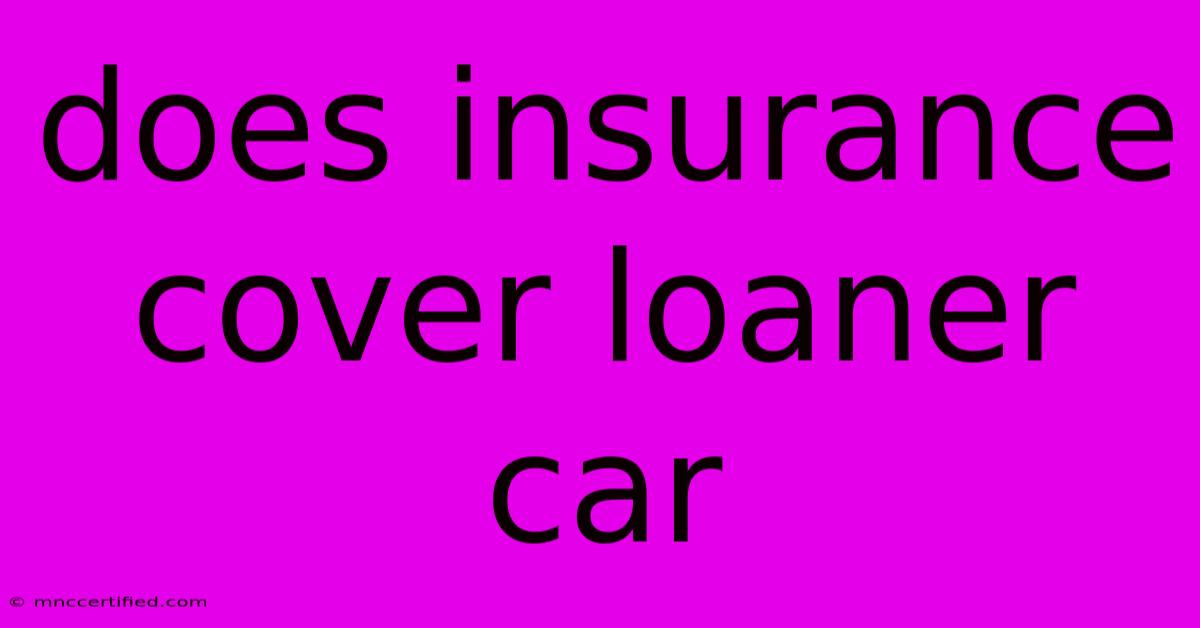Does Insurance Cover Loaner Car

Table of Contents
Does Insurance Cover a Loaner Car? A Comprehensive Guide
Getting into a car accident is stressful enough, but the added worry of transportation can significantly amplify the anxiety. Many wonder: Does my insurance cover a loaner car? The answer, unfortunately, isn't a simple yes or no. It depends on several factors, and understanding these nuances is crucial. This comprehensive guide will clarify the complexities surrounding loaner car coverage and help you navigate this often-confusing aspect of auto insurance.
Understanding Loaner Car Scenarios
Before diving into insurance coverage, it's important to distinguish the various scenarios where you might need a loaner car:
-
After an Accident (Your Fault): If the accident was your fault, your insurance company is unlikely to cover a loaner car. Your own collision coverage might pay for repairs, but it won't typically extend to rental car expenses. This is because collision coverage is designed to repair your vehicle, not provide alternative transportation.
-
After an Accident (Not Your Fault): If the accident wasn't your fault, your chances of getting loaner car coverage improve dramatically. The at-fault driver's liability insurance should cover your rental car expenses, as part of your damages. However, this is contingent on the other driver having adequate insurance and cooperating with the claims process.
-
During Repairs (Regardless of Fault): Even if your insurance covers repairs, it doesn't automatically cover a rental. Some policies offer optional rental car reimbursement coverage, which you'll need to purchase separately. This is a crucial add-on for those who rely heavily on their vehicles.
-
Manufacturer Warranty Repair: If your car is in the shop for repairs covered under the manufacturer's warranty, the dealership may provide a loaner vehicle. This is a courtesy extended by the manufacturer, not a guarantee, and isn't related to your insurance policy.
What Your Insurance Policy Might Cover (and What It Won't)
Let's break down the common insurance coverage types and their relation to loaner cars:
-
Liability Coverage: This only covers damages to other people and property in an accident you caused. It won't cover your rental car expenses.
-
Collision Coverage: Pays for repairs to your car after an accident, regardless of fault. It usually does not cover rental car fees.
-
Comprehensive Coverage: Covers damage to your car from non-collision events (e.g., theft, vandalism). Again, this typically doesn't include rental car reimbursement.
-
Rental Reimbursement Coverage: This is an optional add-on to your policy that specifically covers rental car expenses while your vehicle is being repaired due to a covered incident (collision or comprehensive). This is the key coverage to look for if you want guaranteed loaner car assistance.
-
Uninsured/Underinsured Motorist Coverage: If you're hit by an uninsured or underinsured driver, this coverage might help with your medical bills and vehicle repairs. In some cases, it might also extend to rental car costs, but this varies greatly by state and insurance company.
How to Maximize Your Chances of Loaner Car Coverage
-
Review Your Policy: Carefully read your insurance policy documents. Look for clauses related to rental car reimbursement or any other provisions addressing temporary transportation.
-
Choose Comprehensive Insurance: While it may increase your premiums, comprehensive insurance provides broader coverage, potentially increasing the chances of securing a loaner vehicle if a claim involves non-collision damage.
-
Add Rental Reimbursement: This is the most effective way to guarantee loaner car coverage. The cost of this add-on is generally reasonable considering the peace of mind it provides.
-
Document Everything: After an accident, meticulously document all the damage, take photos, and obtain a police report. This will strengthen your claim for rental car reimbursement if you're involved in a non-at-fault accident.
-
Contact Your Insurance Provider: Immediately report the accident to your insurance company and inquire about rental car coverage.
Key Takeaways
While insurance rarely directly covers loaner cars without specific add-on coverage, several circumstances can lead to reimbursement. Understanding your policy, adding rental reimbursement coverage, and carefully documenting any accident are crucial for securing a loaner vehicle when needed. Don't hesitate to contact your insurance provider for clarification and guidance specific to your policy and circumstances. Remember that rental car reimbursement is an optional add-on, and it's well worth considering for the protection it offers.

Thank you for visiting our website wich cover about Does Insurance Cover Loaner Car. We hope the information provided has been useful to you. Feel free to contact us if you have any questions or need further assistance. See you next time and dont miss to bookmark.
Featured Posts
-
Manhattan Life Cancer Insurance
Nov 26, 2024
-
Semi Truck Insurance In Florida
Nov 26, 2024
-
Bob Geldofs Band Aid 40 Backlash
Nov 26, 2024
-
Adele Speaks Future After Finale
Nov 26, 2024
-
West Ham Areola Starts Against Newcastle
Nov 26, 2024